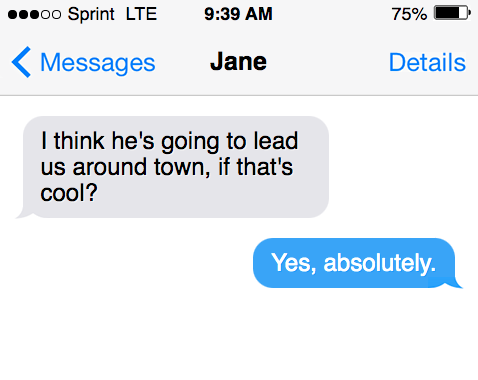Confusing ‘led’ and ‘lead’ is a common mistake in writing in the English language. Learn the difference between the two, and master the correct usage of both to prevent common and embarrassing grammar mistakes in writing (and be a better writer in general).
Fortunately, the difference between lead vs led is a quick and straightforward lesson in basic grammar. The remainder of this article details the key differences between these two words and offers clear instruction on their proper uses.
What’s the difference between ‘led’ and ‘lead?’
The main difference between ‘led’ and ‘lead’ concerns the verb form. The confusion between ‘led’ and ‘lead’ is common and could result in confusing the verb lead with irregular verb forms, like read (that hold the same spelling and pronunciation for future, past tense form, and sometimes even the present tense verb, i.e., they sound and are spelled the same in past and present tense forms of the verb).
Present tense form of the verb
The word ‘lead’ is the present tense form of the verb ‘to lead,’ which means to guide, conduct or steer a person, event or action. ‘Led’ is the past tense of the verb ‘lead’ and refers to an event that has occurred in the past tense (from a temporal point of view).
To get even more temporal, and to the root of the different meanings of the word led and lead: to lead is in the present, and led is in the past. Think, “I’ll lead tomorrow as I led the day that has passed.”

How to use ‘lead’ in a sentence
These sentences demonstrate the correct usage of the verb lead in its present tense form.
Examples:
“A moral person leads by example.”
“If we get lost, I’ll lead the way.”
“If the team wins this game, they’ll be in the lead and could have a shot at victory.”
How to correctly use ‘led’ in a sentence
These sentences demonstrate the correct usage of the verb led in its past participle form or in the past tense.
Examples:
“She led a harsh and brutal life riddled with suffering and agony.”
“One awkward moment led to another, and another, until it seemed the night would never end.”
“While her capriciousness led to compulsive spending on occasion, she was prudent overall regarding her finances.”
When to use ‘led’ or ‘lead’
The English language is mystifying and peculiar because there are things called irregular verbs. The word ‘read,’ for example, is an irregular verb, and this makes the correct tense of other words, like ‘lead,’ confusing.
Using ‘read’ to remember ‘lead’ or ‘led’
‘Read’ sounds similar to ‘lead,’ in the past tense, but the key difference is that the tenses of ‘read’ are all spelled the same, despite referencing different points in time. This is precisely what makes ‘read’ an irregular verb: it stays the same despite the change in verb tense. Normally, a difference in word conjugation correlates with the verb tense form of the word.
This is not the case with ‘read,’ though with ‘lead,’ it is. This is why it’s important not to mistake the irregularities of one with the other. These sentences show the correct usage of both ‘read’ and ‘read’ (in the past participle and present tense form) to gain a better sense.

Examples:
“She would often read at night with her night lamp on by her bedside for hours, immersed in the novel and the compulsive spell of the written word.”
“Will you please read the email I sent you?”
The verb conjugation
From the above, it’s apparent how ‘read’ is tricky since the conjugation stays the same for both past-participle and verb forms. The context in which the verb tense is used reveals which verb tense is correct and appropriate.
Returning to the examples above, the first sentence is in the past tense: other words in the same sentence, such as ‘would’ and ‘immersed,’ confirm that the described event took place in the past.
Time dictates the verb tense, and whether it’s the present, past or future tense that modifies the tenses of the verb. To learn when to use led and lead, first think about whether the sentence should be written in the past, present or future tense.
Is what’s being described taking place right now, at the moment, or has it taken place in the past already? Answering this question helps discern which tense of the verb ‘lead’ vs ‘led’ to use in the relevant context.
Other meanings of ‘lead’
The word lead is a homophone, which means there are two meanings associated with the same spelling and pronunciation. This is true in the case of lead, which has numerous meanings, despite sounding and being spelled the same in various contexts.
Lead can refer to the noun and type of bluish-grey heavy metal in chemistry. If phrases like ‘lead poisoning‘ or ‘lead pipe’ sound familiar, this refers to lead as the noun and toxic element and metal, lead (not the meaning primarily under discussion in this article, meaning to guide). Here are sentences that use lead as a metal (often confused with graphite).
Examples:
“The lead from his pencil got all over his hand while writing.”
“Some believe that the metallic element and toxic metal, lead, is what eventually caused the dinosaurs to go extinct.”
Make sure not to confuse the metallic element with the verb form of lead.

Other meanings of ‘led’
If led is all capitalized, this most likely refers to LED as an acronym. Acronyms are abbreviations where the initial letter represents a complete term in succession.
An example of an acronym is FBI, which stands for the Federal Bureau of Investigation. Another common acronym is NASA, which stands for the National Aeronautics and Space Administration.
LED, as an acronym, stands for Light Emitting Diode and should not be interchanged with the other meaning of the word led (in its past tense form of lead).
The origin of the word ‘lead’
The word lead, and subsequently, led, came into Old English from the Germanic and Dutch languages. Gradually, the verb, lead, and past tense verb led evolved into modern English with their meaning intact.
Related to the Dutch and German, the etymology of lead and led comes from the German leitan, meaning to cause one to show or lead the way.
Sources
- 12 Types Of Verb Tenses And How To Use Them | Thesaurus.com
- Lead Definition & Meaning – Merriam-Webster
- Homophone Definition & Meaning | Dictionary.com
- Verb Tenses – Grammar – Academic Guides – Walden University
- lead | Etymology, origin and meaning of lead by etymonline
- Immerse Definition & Meaning – Merriam-Webster
- Acronym Definition & Meaning – Merriam-Webster
Inside this article
Fact checked:
Content is rigorously reviewed by a team of qualified and experienced fact checkers. Fact checkers review articles for factual accuracy, relevance, and timeliness. Learn more.
Core lessons
Glossary
- Abstract Noun
- Accusative Case
- Anecdote
- Antonym
- Active Sentence
- Adverb
- Adjective
- Allegory
- Alliteration
- Adjective Clause
- Adjective Phrase
- Ampersand
- Anastrophe
- Adverbial Clause
- Appositive Phrase
- Clause
- Compound Adjective
- Complex Sentence
- Compound Words
- Compound Predicate
- Common Noun
- Comparative Adjective
- Comparative and Superlative
- Compound Noun
- Compound Subject
- Compound Sentence
- Copular Verb
- Collective Noun
- Colloquialism
- Conciseness
- Consonance
- Conditional
- Concrete Noun
- Conjunction
- Conjugation
- Conditional Sentence
- Comma Splice
- Correlative Conjunction
- Coordinating Conjunction
- Coordinate Adjective
- Cumulative Adjective
- Dative Case
- Determiner
- Declarative Sentence
- Declarative Statement
- Direct Object Pronoun
- Direct Object
- Diction
- Diphthong
- Dangling Modifier
- Demonstrative Pronoun
- Demonstrative Adjective
- Direct Characterization
- Definite Article
- Doublespeak
- False Dilemma Fallacy
- Future Perfect Progressive
- Future Simple
- Future Perfect Continuous
- Future Perfect
- First Conditional
- Irregular Adjective
- Irregular Verb
- Imperative Sentence
- Indefinite Article
- Intransitive Verb
- Introductory Phrase
- Indefinite Pronoun
- Indirect Characterization
- Interrogative Sentence
- Intensive Pronoun
- Inanimate Object
- Indefinite Tense
- Infinitive Phrase
- Interjection
- Intensifier
- Infinitive
- Indicative Mood
- Participle
- Parallelism
- Prepositional Phrase
- Past Simple Tense
- Past Continuous Tense
- Past Perfect Tense
- Past Progressive Tense
- Present Simple Tense
- Present Perfect Tense
- Personal Pronoun
- Personification
- Persuasive Writing
- Parallel Structure
- Phrasal Verb
- Predicate Adjective
- Predicate Nominative
- Phonetic Language
- Plural Noun
- Punctuation
- Punctuation Marks
- Preposition
- Preposition of Place
- Parts of Speech
- Possessive Adjective
- Possessive Determiner
- Possessive Case
- Possessive Noun
- Proper Adjective
- Proper Noun
- Present Participle
- Prefix
- Predicate



